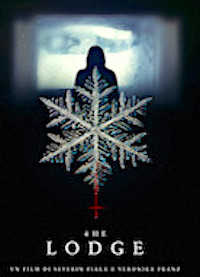Review: The Lodge
 Friday, February 7, 2020 at 3:00PM
Friday, February 7, 2020 at 3:00PM by Chris Feil
 Horror films of the moment are somewhat defined by their expressiveness, rendering intimate terrors with expulsive force. Jordan Peele is at the fore turning intellectual and social ills into visceral experiences, while Ari Aster borders on expressionism while working within a bizarre emotional toolbox. Elsewhere, the genre has been finding something essential in loudly lurid aesthetics and points of view, like Luca Guadagnino’s Suspiria and Coralie Fargeat’s Revenge. Even some of the last month’s horror duds try to find the soul of their scares through bolder stylistic swings.
Horror films of the moment are somewhat defined by their expressiveness, rendering intimate terrors with expulsive force. Jordan Peele is at the fore turning intellectual and social ills into visceral experiences, while Ari Aster borders on expressionism while working within a bizarre emotional toolbox. Elsewhere, the genre has been finding something essential in loudly lurid aesthetics and points of view, like Luca Guadagnino’s Suspiria and Coralie Fargeat’s Revenge. Even some of the last month’s horror duds try to find the soul of their scares through bolder stylistic swings.
What makes The Lodge so darkly thrilling is how it goes against the grain at every opportunity to go big. Instead, it does the opposite - what terrifies is when it looks inward toward the void, only a blunt emptiness flows out in response...
This isn't a genre film of bold or brash spectacle, but of staring into the chilling, irreconcilable paradoxes within our darkest selves. Less arresting or cathartic than the films you might expect it to share kinship with, The Lodge is moreso consuming and bleak.
At the center of the economically composed film is a family in crisis. Preteen brother and sister Aidan and Mia (Jaeden Martell and Lia McHugh, respectively) cope with the fallout of their father’s (Richard Armitage) affair, with their sympathies naturally falling towards their mother (Alicia Silverstone, in a cameo). When tradition dictates they spend Christmas at the isolated, snow-logged family lodge, Aidan and Mia must be left alone with their new stepmother, the mysterious Grace (Riley Keough). Things start tense and stunted, but quickly turn to complete icy hell, making for a disorienting trip into the cracks between the real and the imaginary.
The film provides yet another showcase for Keough to deliver the unexpected, maximizing the aspects of her screen persona that feel alive while also unknowable. Grace is haunted by a history of religious trauma, with the home’s Christian artifacts taunting her with increasing stress. You expect exorcism or explosion in the performance, but Keough quietly delivers something that is simultaneously heartbreaking and chilling in its remove. Where the film occasionally runs to thinner stretches, the actress invigorates it with a captivating sense of standing on the precipice of psychosis.

There is a recognizable borrowed textures between this and directors Veronika Franz and Severin Fiala’s previous feature Goodnight Mommy. But this film marks a significant step forward for the director duo after that first effort was sunk by a silly twist made fatally obvious from its opening moments, despite its visual impressiveness. Again they offer something distinctly fatalistic in an isolated setting, but this time the grimness explores natural psychological tensions in parent-child relationships that fascinate. They somewhat boldly invite comparisons by invoking John Carpenter's The Thing, and what it ultimately borrows from that snowbound horror classic (more its quiet final tone than anything like gore and jump scares) might indicate how much The Lodge will or won't appeal to the tastes of the viewer.
The Lodge mines stifled depression and dormant religious punishment for a uniquely unsettling experience, one that might not satisfy all viewers, even horror aficionados. What’s most terrifying is the sense of helplessness it conjures, and a sense of inevitability to its violence, as it slowly immerses us into a very dark headspace. It’s a horror borne of despair, manipulated and reinforced by religion and the expectations of the nuclear family unit. But thanks to pristine visual intrigue and its reversal of trending horror "rules", the film’s darkness is also daring.
Grade: B
 Horror,
Horror,  Reviews,
Reviews,  Riley Keough,
Riley Keough,  The Lodge
The Lodge 


Reader Comments